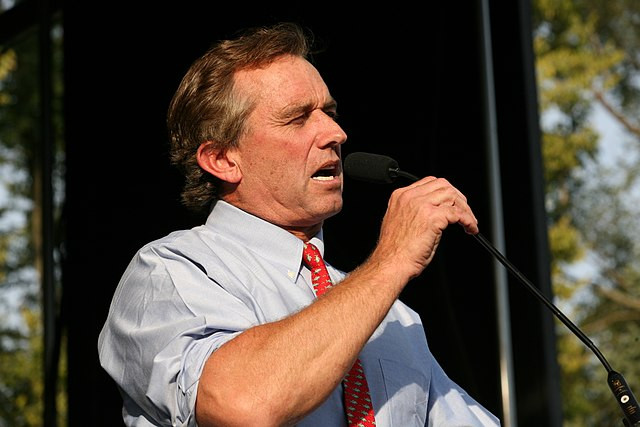Independent presidential candidate Robert F. Kennedy Jr. has accused President Joe Biden and former President Donald Trump of "colluding" to exclude him from the presidential debates after the two candidates agreed to participate in events hosted by CNN and ABC News. Kennedy, who currently falls short of meeting the qualifying criteria set by the networks, claimed that Biden and Trump are attempting to lock America into a head-to-head matchup that "70% say they do not want."
In a post on X (formerly Twitter) on Wednesday morning, Kennedy stated, "Presidents Trump and Biden are colluding to lock America into a head-to-head match-up that 70% say they do not want. They are trying to exclude me from their debate because they are afraid I would win. Keeping viable candidates off the debate stage undermines democracy."
CNN announced that it will host a debate in Atlanta on June 27, while ABC News will host a second debate on September 10. To qualify for the CNN debate, candidates must meet a 15% polling threshold in two out of four qualifying polls and "appear on a sufficient number of state ballots to reach the 270 electoral vote threshold to win the presidency prior to the eligibility deadline." ABC News has released similar qualifying criteria for its September debate.
According to Stefanie Spear, press secretary for the Kennedy campaign, the independent candidate would accept an invitation from CNN to debate Biden and Trump if he qualifies. Kennedy's campaign manager, Amaryllis Fox, posted on X Wednesday afternoon that they "anticipate fulfilling all participation criteria" by June 20 and "look forward to offering American voters the three-way debate they deserve."
Despite Kennedy's confidence, the campaign faces an uphill battle to secure ballot access in enough states to meet the 270 electoral vote threshold by CNN's June 20 deadline. Many state deadlines for independents to gain ballot access fall after the scheduled date of the first debate, potentially limiting Kennedy's ability to qualify.
The Kennedy-Shanahan ticket has achieved ballot access in six states, including Utah, Michigan, California, Delaware, Oklahoma, and Texas, according to the campaign. Additionally, they claim to have garnered enough signatures for ballot access in eight more states, including New Hampshire, Nevada, Hawaii, North Carolina, Idaho, Nebraska, Iowa, and Ohio. However, the campaign has chosen to delay submitting signatures in some states until closer to their respective deadlines to avoid extra scrutiny from the Democratic National Committee.
In a recent interview with Raymond Arroyo of the Catholic network EWTN, Kennedy alleged that the DNC has an "enormous operation" and "$3 billion to spend to try to keep us off the ballot." He explained, "We are not releasing our signatures until the last minute because it just gives them you know, more targets to hit, much shorter period of time."
The qualifying criteria set by CNN and ABC News are similar to those previously established by the Commission on Presidential Debates (CPD), which has traditionally hosted general election debates. The CPD has maintained comparable standards since the 2000 cycle, when Reform Party candidate Pat Buchanan and Green Party candidate Ralph Nader criticized the criteria for keeping them off the debate stage.
As the presidential race heats up, the battle over debate participation has brought to light the challenges faced by independent candidates in securing a platform alongside their major party counterparts. While Kennedy and his supporters argue that excluding viable candidates undermines democracy, the networks and the CPD maintain that their criteria ensure a fair and manageable debate process.






